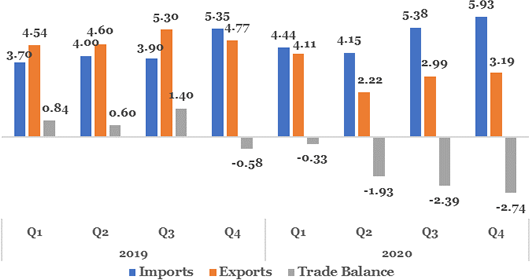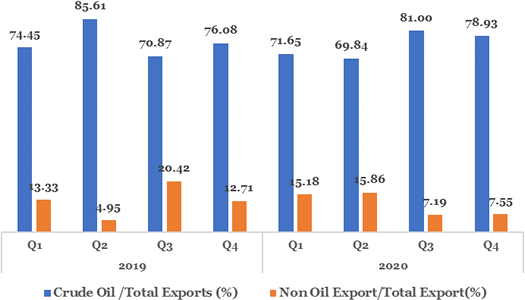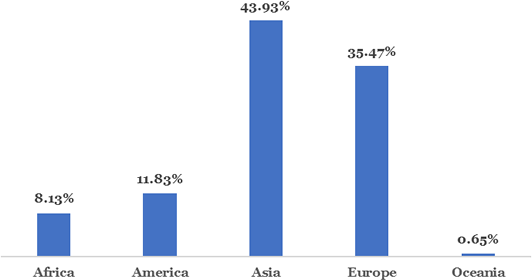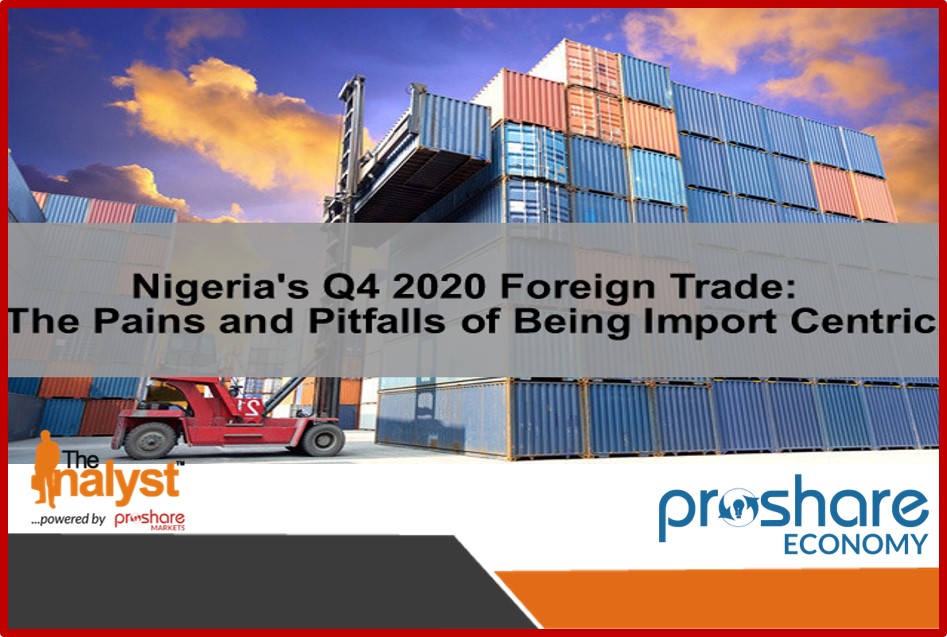Monday, March 15, 2021, / 09:07 AM / by Proshare Research / Header Image Credit: CIJ INT'L/Ecographics
Nigeria's high import dependency has become analbatross in a global environment where nation's have become increasinglyaggressive in promoting exports. Unfortunately for the country, it neitherinfluences the price or the quantity sold of its principal export, crude oil,which accounts for over 80% of its export and 90% of its foreign exchangeearnings. Nigeria's relative global trade position is stacked against astrategic forward-facing dominance in any good or service, meaning that futureearnings could be painfully small relative to development goals.
In the datasupplied by the National Bureau of Statistics (NBS), Nigeria recorded a tradedeficit of N7.37trn in 2020 while its total trade stood at N32.42trn. In Q42020, Nigeria's total merchandise trade stood at N9.12trn, an increase of +8.9% when compared to Q3 2020 but a declineof -9.9% when compared to Q4 2019. The exportcomponent of trade stood at N3.19trn in Q4 2020 representing an increaseof +6.7% when compared to Q3 2020 but a declineof -33% when compared to Q3 2019.
On theflip side, total imports stood at N5.92trn in Q4 2020, an increase of +10.1% when compared to Q3 2020 and an increase of +10.8% when compared to Q4 2020. Imports accountedfor 65% and exports accounted for 35% of total trade in 2020 (seeChart 1).
Chart 1: Nigeria's Trade Statistics (N'trn)

Source: NBS, ProshareResearch
Thetrade data shows that the Nigerian economy is still primarily dependent onimports and is yet to deepen its value chains and diversify its export earningsaway from crude oil. Analysts note that Nigeria's consistent trade deficit resultsand its overdependence on oil expose its economy to external factors whichcontinuously hurt it. For example, its high dependency on imports implies thatit keeps losing domestic jobs that could have been created if such productswere produced locally. Also, being import-dependent has made the economyvulnerable to inflation and other external factors.
Nigeria'strade deficit in 2020 could be attributed to various factors such as thecoronavirus pandemic, Nigeria's FX crisis, insecurity, ports congestion, and soon.
Nigeria'sexport trade in Q4 2020 was dominated by crude oil exports which accounted for 78.93%of total exports and other petroleum oil products 13.52% while other importantsources of FX recorded relatively low value and contribution to export earningsi.e., manufacturing, and agricultural only accounted for 4.04% and 1.75% oftotal exports respectively. (see Chart 2).
Chart 2: Nigeria's Crude Oil and Non-Oil Export toTotal Exports (%)

Source: NBS, ProshareResearch
Trade Bother
Nigeria'strade numbers reveal the fragile state of the economy. Despite the government'sefforts at industrialization, and increasing non-oil exports, the economy stillimports a high quantity of manufacturing, agricultural, and raw material goods.
Someof the government's efforts include facilities and programs such as the Non-oilExport Stimulation Facility (NESF), Export development Funds (EDF), Zero oilplan by Nigeria Export Promotion Council, etc.
Althoughit has a huge expanse of arable land, the Nigerian economy in Q4 2020 importedagricultural goods valued at N532.4bn and only exported agricultural goods valuedat N55.78bn. Nigeria's large import of agricultural produce speaks volumes ofthe inherent crisis in the agricultural sector such as farmer's/herder'scrisis, insecurity, lack of storage facilities and infrastructure, logistics problems,etc.
Nigeriahas been unable to utilize its huge arable land and the application oftechnology to making its agricultural produce more competitive hence the reasonfor the high import of agricultural produce.
Historicalanalysis of advanced and emerging nations such as Singapore, Taiwan, Japan, etchas shown that there are a plethora of opportunities that industrializationpresents to a nation ranging from increased employment, revenue generation,reduced dependency, and so on. It becomes increasingly worrisome that thevarious industrialization plans, policies, and incentives touted by both theFederal Government and the CBN are yet to yield any positive sustainable resultin Nigeria's manufacturing sector.
Afew analysts note that the difficulty in accessing FX by manufacturers, portscongestion, insecurity, poor infrastructures, etc increases the cost ofmanufacturing in Nigeria and reduces the competitiveness of Nigeria'smanufacturing sector, hence crowding out the impact of these policies inboosting productivity. There has been renewed effort by the Federal governmentand the CBN to solve some of the challenges faced by manufacturers in Nigeriae.g., CBN recently launched the "Naira 4 Dollar Scheme" aimed at improving FXsupply, the electronic call-up system aimed at decongesting the ports in Lagos.
Despitethese renewed efforts, if the fundamental problems are not addressed thesechallenges will persist. Nigeria's share of manufactured export to totalexports in Q4 2020 was low while its imports of manufactured goods were high.The trade numbers for Q4 2020 reveal that Nigeria's total manufacturing exportto total exports was 4.04% valued at N129.05bn while its manufacturing importto total imports was 64.56% valued at N3.83trn (see Table 1).
Table 1: Nigeria's Top Export and Import Products inQ4 2020
| Nigeria's Top Exports and Imports in Q4 2020 | ||
| Top Exports | N'trn | % of Total Exports |
| Crude oil | 2.52 | 78.93 |
| Other Petroleum Oil Products | 0.431 | 13.52 |
| Manufactured goods | 0.129 | 4.04 |
| Agricultural goods | 0.0558 | 1.75 |
| | ||
| Top Imports in Q4 2020 | ||
| Top Imports | N'trn | % of Total Imports |
| Manufactured Goods | 3.83 | 64.56% |
| Other Petroleum Oil Products | 0.822 | 13.88% |
| Raw Materials | 0.716 | 12.08% |
| Agricultural Goods | 0.532 | 8.98% |
Source: NBS, ProshareResearch
AfCFTA: Opportunities andDrawbacks
Nigeria exported moregoods than it imported from Africa in Q4 2020 i.e., the total value of exportedgoods to Africa in Q4 2020 stood at N551.13bn while the value of imported goodsfrom Africa stood at N190.08bn. Itstrade with Africa only accounted for 8.13% of its total trade in Q4 2020 whencompared to other regions such as Asia 43.93%, Europe 35.47%, America 11.83% (see Chart 3 below).
Chart 3: Nigeria's Trade withRegions in Q4 2020

Source: NBS, ProshareResearch
Furthermore, Nigeria'stop three export produce to Africa in Q4 2020 were crude oil N431.37bn,manufactured goods N110.7bn, and energy N4.97bn. On the other hand, its topthree imports from Africa were raw materials N78.86bn, manufactured goodsN75.46bn, and agricultural goods N18.75bn (see Table 2 below).
Table 2: Nigeria's Trade withAfrica in Q4 2020
| Nigeria's Trade with Africa in Q4 2020 | ||||
| | Export | Import | ||
| | N'bn | % to Total Exports | N'bn | % of Total Imports |
| Agricultural Goods | 0.824 | 0.15% | 18.75 | 9.86% |
| Solid Minerals | 2.7 | 0.49% | 3.51 | 1.85% |
| Manufactured Goods | 110.7 | 20.09% | 75.46 | 39.70% |
| Raw Materials | 0.63 | 0.11% | 78.86 | 41.49% |
| Energy | 4.91 | 0.89% | 0 | 0.00% |
| Crude Oil | 431.37 | 78.27% | 0 | 0.00% |
| Other Oil Products | 0 | 0.00% | 13.51 | 7.11% |
| Total | 551.13 | 100% | 190.08 | 100% |
Source: NBS, ProshareResearch
Nigeria's Q4 2020 tradedata suggests that Nigeria trades very little with Africa and could lose theopportunity of becoming the industrial hub of Africa. Its manufacturing exportto Africa only accounted for 20.09% of its total export while its export ofcrude oil accounted for 78.27% of total exports to Africa.
Therefore, if it is goingto take advantage of the AFCFTA and douse the fear that Nigeria will be adumping ground, concerted efforts must be taken towards driving productivityand trade with other African nations while ensuring that proper goods standardsare met and empowering its customs with technology to prevent smuggling ofcounterfeited goods. It is pivotal that Nigeria focuses on deepening itsmanufacturing sector by increasing the provision of credit facilities, taxincentives and eliminating all encumbrances that will hinder its manufacturingsector's competitiveness.
Related News
1. Q4 2020Foreign Trade Report: Recovery Not Enough
2. Total Trade Higher By 8.9% in Q42020, Lower By 10.3% in FY 2020
3. Nigeria'sCOVID-19 Induced Foreign Trade Decline - PFI Capital
4. TradeDeficit Expands to a New 4-Year High in Q3 2020
5. TradeGrew in Q3 2020 Due to Faster Increase in Imports But Slower Recovery inExports
6. SharpDecline in Merchandise Trade in Q2 2020
7. Nigeria'sForeign Trade Figures Decline 5% Q-o-Q in Q4 2018
8. NigeriaRecords Strong Growth in Foreign Trade
9. Nigeria'sForeign Trade: Review and Implications
10.ForeignTrade Review Q3 2017 - Trade Balance Surge on Rising Exports
11.Q2'16Foreign Trade Review - Deficit Correction Dependent on Improved Crude OilVolumes
 Lagos, NG • GMT +1
Lagos, NG • GMT +1











 1719 views
1719 views












 Sponsored Ad
Sponsored Ad
 Advertise with Us
Advertise with Us









